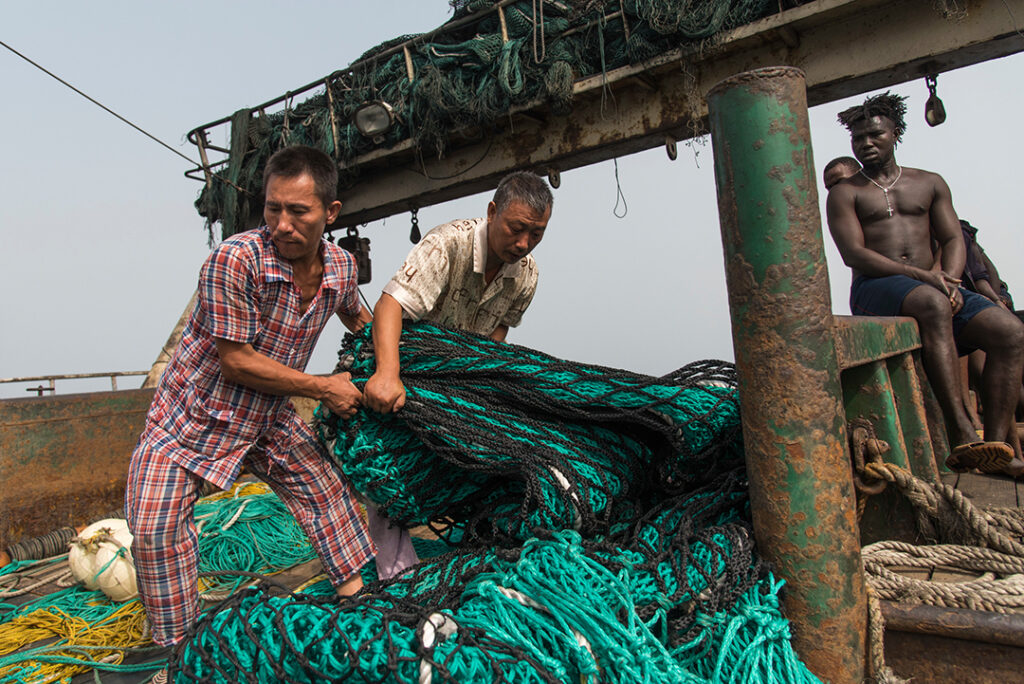ADF STAFF
Joseph Fofana, a 36-year-old fisherman in Sierra Leone, recalled a time when he could see large fish breaking the water from the docks at Tombo, a coastal fishing village.
Those days are long past. According to Fofana and other fishermen interviewed by The Guardian newspaper, a steep decline in fish stocks has left the nets of local fishermen as empty as their stomachs and wallets.
Fofana earns about 50,000 leone (less than $4.50) for working 14-hour days at sea.
“This is the only job we can do,” Fofana told The Guardian. “It’s not my choice. God carried me here. But we are suffering.”
Many fishermen in Tombo blame vessels from China’s distant-water fishing (DWF) fleet for engaging in illegal, unreported and unregulated (IUU) fishing in the region. China commands the world’s largest DWF fleet and is the world’s worst IUU offender, according to IUU Fishing Index. Chinese fleets have targeted Sierra Leone and other West African nations for decades.
The results have been devastating to the roughly 500,000 people who work in Sierra Leone’s small-scale fisheries. Fisheries represent 12% of the economy and provide 80% of the population’s protein consumption, according to United Nations Food and Agriculture Organization Statistics.
In 2018, Sierra Leonean President Julius Maada Bio said IUU fishing costs the country $50 million a year.
“The Chinese fleet has been taking the profits of the fisheries for 30 years and the impact on fish stocks has been terrible,” Stephen Akester, an adviser to Sierra Leone’s Ministry of Fisheries and Marine Resources between 2009 and 2021, told The Guardian. “The resources are disappearing, fishermen are suffering, families are starving. Many have just one meal a day.”
The decline of fish stocks has caused the price of fish to soar, according to a report by Sierra Leonean news channel SLBC TV.
Mariatu Koroma, a regular customer at a Tombo fish market, described the rising prices as “shocking.”
“I come to buy fish and other things, but the price of fish makes it difficult for me to purchase the remaining items,” Koroma told the station, adding that she has “many mouths to feed.”
Isatu Mansaray, another customer at the market, agreed.
“After buying the fish, there’s little or no money left for me to buy other items,” Mansaray told SLBC TV. “Due to the fish scarcity, the price has skyrocketed.”
The lack of fish also forces fishing boat operators to go farther out to sea, causing them to purchase more fuel, according to fisherman Phillip Saffa.
“Therefore, we have to sell at a high price to be able to gain a little profit,” Saffa told the station, adding that foreign trawlers use destructive gear in the hunt for fish. “Their own bad fishing habits have destroyed our fish.”
Besides fishing in prohibited areas, Chinese vessels are known to damage the equipment of small-scale fishermen and act aggressively at sea. Mackerel fisherman Alusine Kargbo, 34, said Chinese crews threw boiling water at him when he confronted them about fishing illegally.
“Before, the trawlers weren’t in our zones, now they are,” Kargbo told The Guardian. “The difference is so great [in terms of his catches] compared with before, I’m struggling to feed my children.”
Although Bio has pledged to crack down on IUU fishing, Chinese trawlers own about 40% of the country’s industrial fishing licenses, according to Sierra Leonean Ministry of Fisheries data. Locals say that license fees do little to help the economy.
Abbas Kamara, an officer at Tombo’s Fisheries Ministry, acknowledged receiving “a lot of reports” about IUU fishing.
“But it’s difficult to corroborate,” Kamara told The Guardian. “The trawlers work day and night. Fish is very important to Tombo — it’s how people survive — but the fish go to the Chinese.”
Last June, Sierra Leone’s plan to build a $55 million industrial fishing harbor on 100 hectares of beach and protected rainforests further enraged local fishermen.
The Chinese-backed project at Black Johnson Beach includes a fish processing plant in a tourist area 35 kilometers south of Freetown, the capital. It borders virgin rainforest that is home to chimpanzees and protected bird species, as well as Western Area Peninsula National Park, where endangered species such as duiker antelope and pangolins live.
A nearby lagoon is a breeding ground for fish and turtles and opens up into a river during the rainy season, while the waters of Whale Bay brim with sardinella, sardines, barracuda and grouper. Conservationists worry that the industrial fishing harbor will damage the ecosystem and further threaten marine life.

